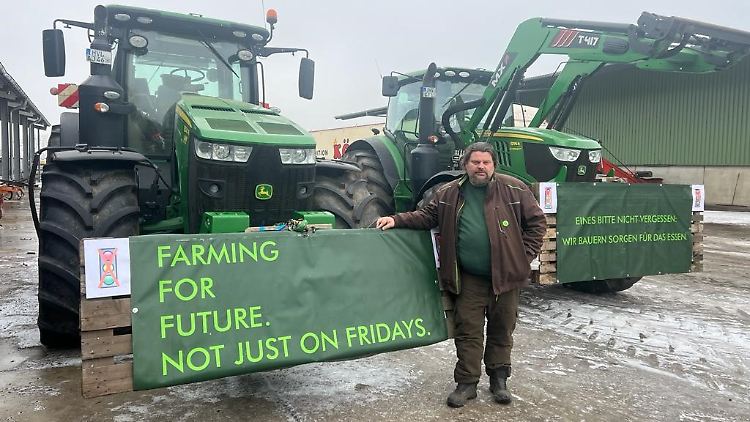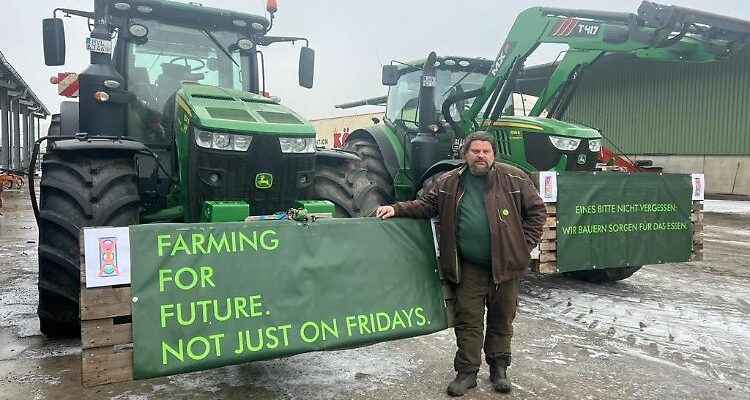The farmers have swallowed so many compromises in recent years that the time for compromise is over, says farmer Christoph Plass from Brandenburg. He is concerned that there are now too many expectations associated with the farmers’ protests, especially in rural areas. But he also says: If the farmers’ demands are not met, the protest will continue.

Christoph Plass mainly grows potatoes on his farm in Neuholland, north of Berlin. At 2,000 hectares, the farm is comparatively large, but it is still a “family business with employees,” as Plass says. The farmer is also vice chairman of the farmers’ association in the Oberhavel district.
(Photo: private)
ntv.de: Hello Mr. Plass, where did you block today?
Christoph Plass: Today, as an exception, I was working in the office – among other things, to prepare for January 15th, the day of the major rally in Berlin. The other Oberhavel farmers were on the Berlin motorway ring near Kremmen today to show their colors. But we didn’t make any major blockages today.
This is not the first time you have been involved in protests. When did you start?
I was at the first farmers’ demonstrations in October 2019 and went to a rally in Berlin. And as it happens, I asked people there if I could help. That’s how I got involved in this demonstration story.
The current focus is primarily on the federal government’s planned gradual abolition of the agricultural diesel subsidy. Agricultural economist Alfons Balmann says the cuts are “painful, but manageable in the long term” and that the existence of the companies is not threatened. Would you agree to that?
The question is different for every company. But even if the cut could be tolerated by all companies, it is still incomprehensible. Because for us there is no alternative to diesel.
Because your vehicles do not run on electric motors.
There is neither e-mobility nor hydrogen propulsion for agricultural machines. There are research projects on this, but they are still a long way from being practical. In my opinion, there will be no alternative to diesel for at least ten years.
Can we say how important the refund of the energy tax on agricultural diesel is for an average farm?
At my scale, that’s relevant. We are an intensive operation that also uses a lot of fossil energy, including in the irrigation systems for our potatoes. But for every farm, it’s like cutting off a month’s salary from a normal employee from one day to the next.
Balmann also says that the requirements for topics such as climate protection, animal protection or biodiversity protection require adjustments that many companies will not be able to make. Are you perhaps protesting against the wrong measure?
You often hear this from many farmers now, saying that the diesel decision was the last straw that broke the camel’s back. But actually the barrel didn’t overflow, it exploded – that’s how much pressure the farmers are under. The Agriculture Minister of Brandenburg has in one interview said that a position that excludes compromise is always excessive in a democratic system. I’ve thought about this for a long time. I think he’s wrong: we’ve swallowed so many compromises in recent years and accepted things that we knew were wrong. Now the time for compromise may simply be over.
In your opinion, what would have to happen first to relieve the burden on farmers?
First of all, it would be a good signal if it were clearly stated that both measures will be withdrawn 100 percent.
So not only the abolition of the vehicle tax exemption for agricultural vehicles, which has already been withdrawn, but also the abolition of the tax relief for agricultural diesel.
Otherwise, there have been so many wrong political decisions in recent years that I don’t even know where to start. For example in animal welfare. Everyone wants more animal welfare, and we farmers should implement that. That means: converting the stables, investing. Consumers are not prepared to pay for this voluntarily: We see that people don’t promise at the checkout that when in doubt they would rather go for the cheaper meat. In 2015, the Scientific Advisory Board for Agricultural Policy at the Federal Ministry of Agriculture assumed that the conversion of low-altitude farming would cost up to 5 billion euros per year. The state is expected to provide 250 million euros in annual support. I generally think that little government is a good thing, and I also find it difficult to understand that people always ask about the government. But unfortunately agricultural policy only works with government intervention and subsidies.
Is it just because of the money or are the farmers fed up with the changes?
We farmers are always ready to adapt to new challenges. We’ve been doing this for centuries. My family has been farming since the 19th century and over time we have built several farms in different locations – partly due to fire damage and resettlement. I myself came to Brandenburg from Lower Saxony 25 years ago. But 250 million at a cost of 5 billion? Who should pay the discrepancy? Nobody can do that! And then you’re surprised that farmers get angry or give up and give up their farms.
Does the feeling of lack of recognition also play a role in the protests?
I think the population’s reaction to the current protests shows that there is now a fundamental recognition for agriculture. Since 2019, I’ve seen that when we drive the tractor to demos, we get thumbs up. People already know that we produce food, that we make sure that they have a bread roll every morning. And of course it’s also about appreciation, but primarily about ensuring that the social services we provide are rewarded.
You have a relatively large operation. Do you even have the same interests as a small farmer in Baden-Württemberg?
Since I come from Lower Saxony, I also know the West German agricultural structures. In my opinion, a large company provides just as much social service as a company in the Swabian Alb. Of course we all have different operating structures, but I think that’s exactly what’s good. We just made a banner that was primarily about this infiltration. It says: Agriculture is colorful. This can also be related to the size of the company. Everyone does what they are good at. When I came to Brandenburg, I wanted to bring my products to the market in Berlin. That didn’t really work; 20 years ago nothing could be done with regionality. So we developed differently and became bigger. I’m not dissatisfied with that. We are a modern company, we are very advanced in digitalization, and in some respects we are even pioneers. That makes me a little proud too. And even though we are a large company, we have the same interests as smaller companies or someone who keeps animals.
There is currently talk of farms dying again. Is the reason for this more often that companies go bankrupt, or is it more the next generation’s decision not to work in agriculture?
I think it’s a mix of both. Pig farmers in particular have been hit hard economically in recent years. My first child is now about to graduate from high school, so you’re wondering whether I can really recommend studying agriculture. It’s difficult, it’s a lot of work, plus there’s the political fuss. When treating a sick animal, 30 percent is work on the animal and 70 percent is bureaucracy. This no longer has much to do with the actual work of a farmer. Sometimes I have the impression that we are becoming paper tigers.
Farmer President Rukwied received EU subsidies of almost 110,000 euros in the 2022 financial year, making him no exception.
This is completely legitimate.
But isn’t it strange to protest against a system that benefits you so much?
That’s not strange. Agricultural policy is always characterized by subsidies. Any farmer would immediately abandon the subsidy system if people were willing to pay the price that the product then costs. But unfortunately agricultural markets do not work like other markets. We see this in the Ukraine war, how Russia tries to exert pressure through grain blockades. The state also uses subsidies to achieve a steering effect. The system is certainly in need of reform. But how? Beats me.
You are not only involved in the farmers’ association, but also in the FDP. Why in a party whose leader sees subsidies as part of left-wing politics?
I also believe that subsidies are not always the right way. But unfortunately it often doesn’t work without it. It’s easy to explain why I’m involved in the FDP. I am liberal and believe in freedom and that you shouldn’t bully people too much.
You have already mentioned the attempt at infiltration from the right. Right-wing extremists also appear at the farmers’ protests; in some cases you can see hats in the colors of the Reich flag or the “rural people’s movement”. In your opinion, is there a problem with right-wing infiltration?
No. It’s no secret that the AfD is trying to gain a foothold in our country. But the nice thing about farmers is that they are all independent people who can think. I’ve been traveling for days now, I’m talking to a lot of people and calling people all over Germany. I don’t see this infiltration at all.
You will probably also be at the large demonstration in Berlin on Monday?
I canceled my vacation just a few days ago. I actually wanted to set off for Hungary with a few friends on Saturday. Instead I will be in Berlin. The matter is simply too important to me.
Is this then the high point and end point of the campaign week?
Well. That depends on whether our demands are met. Our protest has now created very high expectations in rural areas. People hope that more will change. Freight forwarders support us, there are now hauliers in our Whatsapp groups, we have trucks with us every day. Craftsmen are there, all report similar problems – economic difficulties, too much bureaucracy. It makes me a little worried that there are so many expectations associated with our demonstrations. But that’s why I think it probably won’t be over on January 15th.
Hubertus Volmer spoke to Christoph Plass
